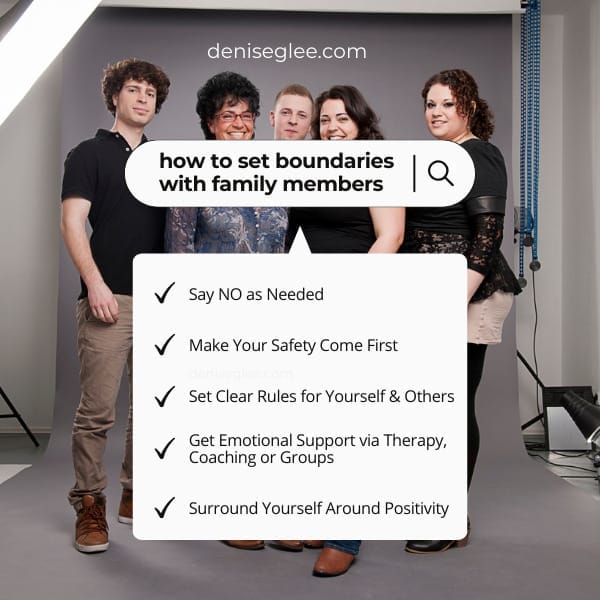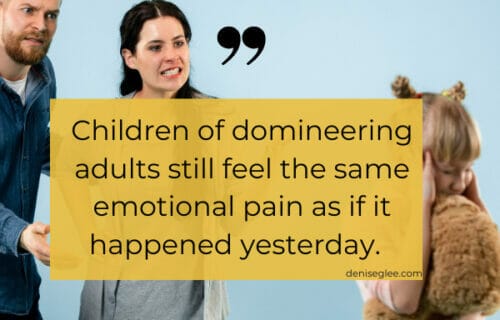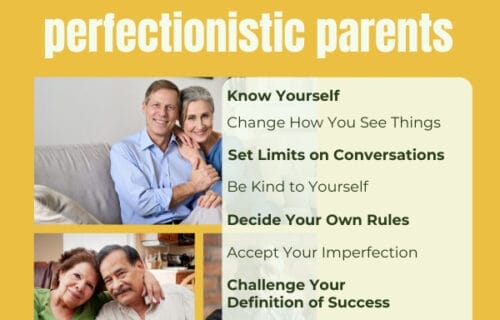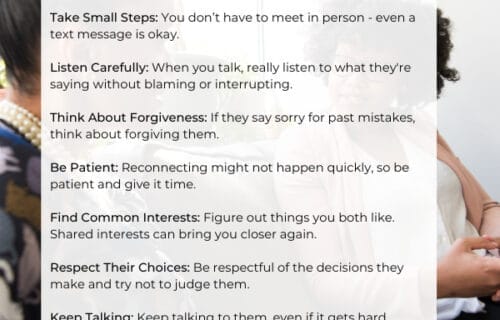
Setting Boundaries: How to Stay Safe from Unsafe Relatives
I’m a coach who helps entrepreneurs. Many people I work with struggle to set healthy boundaries with family members, especially if they’ve been through tough times.
One common challenge is feeling pressured by family or friends to reconnect with people who’ve hurt them before. In this article, we’ll discuss why it’s hard to create and maintain boundaries and how you can stay safe from unsafe relatives or family members. First, let’s talk about enmeshment and what is looks like to be raised in an enmeshed family.
When we have been raised to think less of the "I" and more of the "we," we start to lose our identity. We become glued to the feelings of others, to the point where our own desires and need for safety become an afterthought.
Denise G. Lee Tweet
What is enmeshment?
Families come in many different shapes and sizes. Some of us grew up in single-parent households, while others were part of a multigenerational family, where grandma or a cousin lived with us.
Regardless of the structure of the family, some families failed or were unable to recognize the needs of each member. When one or more family members depend psychologically on another family member for a sense of worth and being, that is called enmeshment. This is beyond just feeling bonded to someone else, it is a form of attachment that melds people on a deep psychological level. And enmeshment, left unchecked, causes problems for everyone in the family.
Causes of enmeshment
The causes of enmeshment are diverse, but they are often due to:
- emotional and/or financial instability between parents or caregivers,
- addiction or compulsive behavior by one or more family members,
- chronic stress and miscommunication between the parents,
- emotionally disabled or dysregulated nervous systems of one or more of the caregivers,
- death or some other tragedy in the home, or
- living in an unsafe, dangerous or otherwise traumatizing environment.
In all cases, the caregiver, usually the parent, is under chronic stress and looks to one or more family members to provide them comfort to alleviate their anxiety.
Breaking away from controlling, condemning, and critical family members can feel like death to an enmeshed family member because their whole sense of purpose and being is tied to you or other family members.
Denise G. Lee Tweet
What enmeshment looks like in a family
When one or more family members are enmeshed, there is a blur between where one family member ends and the other begins. There are constant demands as to how each family member must behave in and outside the family.
Major life decisions have to be approved, usually by the head of the household, who could be mom, dad, or even a distant grandmother. There are implicit rules that must be followed, or else face the wrath of the controlling member of the household. The pressure to receive approval under that kind of unrelenting judgment and criticism can be overwhelming at times.
In the next sections, I will share with you a family story to explain why being too closely connected (enmeshment) is not good for anyone. I’ll also talk about how we can keep our own identity separate from our family and protect ourselves from harm.
Wrestling Royalty - The Von Erich Family
Family Business. Family Tragedies.
The family leader, Jack Adkisson or Fritz Von Erich, used the “Von Erich” name for his wrestling character and his identity as a father of five sons. But this mix-up between his wrestling persona and his real-life role as a dad caused difficulties for the family.
Keeping it all together.
The Von Erich boys started watching their dad wrestle when they were young, learning about the wrestling business. Kevin, David, and Kerry Von Erich, born close in age, began training for wrestling early. They lived in the countryside and, when not training, would go hunting with their dad, building a strong family bond.
When the boys were old enough, they entered the world of professional wrestling, helped by their dad’s influence. After Fritz retired from wrestling, he took charge of World Class Championship Wrestling and guided his sons to success. According to Kevin, their close bond as siblings made it easy to communicate without words in the ring. With their dad leading the way, the three brothers quickly rose to fame in the wrestling world.
Meteoric rise to fame
Kevin, David, and Kerry, became very successful in pro wrestling during the ’70s and ’80s. Their success was partly because their dad helped them get attention. The popularity of wrestling on TV at that time also played a big role, reaching a wider audience.
Each brother had something special to offer. Kerry stood out for his physique and charisma, David for his technical wrestling skills, and Kevin for his amazing speed and agility. They became famous, appearing on TV and even in comic books, where they faced fictional challenges in sci-fi settings. There are black and white comic books showing the Von Erichs, along with their dad Fritz, dealing with intergalactic threats. (Source: Wrestling Inc)
And all the kids kept dying
At the seemingly high point of their wrestling careers, tragedy struck. In 1984, David was found dead in a hotel room, caused by an acute enteritis which caused a heart attack. Next came the suicides of Mike, Chris, and Kerry at ages 23, 21, and 33.
Wrestling is a tough job, both physically and mentally, and it may have made things even harder for the Von Erich brothers, especially because they didn’t separate their personal lives from their wrestling careers.
The Von Erich story is a warning about what can happen when emotional boundaries aren’t clear. The connections between family influences, competition between siblings, and the challenges of wrestling all mixed together, leading to serious personal losses.
The Von Erich family story isn’t just about wrestling fame; it reminds us how crucial it is to have good emotional boundaries in families. It tells people to find a balance between who they are, their family connections, and the pressures from the outside world. This helps keep work challenges from affecting personal well-being.
Next, lets talk about why it may be hard for you to having boundaries with family members.
Why boundaries and self-care are hard for survivors of childhood abuse
Most of us will never experience a life like the Von Erich Family did but all of us experienced pressure to stay connected to family, no matter what.
If your family is emotionally and financially bonded or enmeshed, this is really difficult as they may cause you to reconnect with other relatives who have caused you pain. They might not realize how much you’ve been hurt, thinking family should always stay connected no matter what.
I’ve been in similar situations myself, where relatives wanted me to rebuild relationships with people who hurt me. But it’s crucial to know that taking care of your well-being doesn’t mean you’re holding onto anger forever. It’s about doing what’s best for everyone, including yourself.
Many people have learned from a young age to endure mistreatment and neglect. To heal from this trauma, it is important to establish boundaries with those who originally caused the harm, which unfortunately for many, may include family members.
Denise Lee Tweet
True healing and recovery comes from setting and respecting your boundaries, protecting your mental and emotional health, and being around positive influences. Below are some tips to help you create boundaries with family members who have abused you.
How to Create Better Boundaries with Unsafe Family Members
1. Say No As Needed:
If a family member has hurt you verbally, physically, or psychologically, it’s okay to say no to them, no matter what others might say. Your well-being is important, and distancing yourself from harm is a valid step in getting better.
But always keep your side of the street clean by treating others kindly and with respect.
2. Make Your Safety Come First:
It’s not a good idea to reconnect with someone who hurt you just to keep family ties or because others want it. Your recovery and feeling better come from setting and respecting your boundaries. Make sure your mind and feelings are taken care of.
Bullies will get angry when their punching bag is taken away. Don't be surprised if they try to pull you back into dysfunctional tendencies once you decide that you don't want to play the victim anymore.
Denise Lee Tweet
3. Set Clear Rules:
Decide what you’re comfortable with and what you’re not. It’s okay to set limits on how much you talk or spend time with certain family members. This helps keep you safe from more harm.
4. Surround Yourself with Positivity:
Getting better comes from being around good influences. Find friends, support groups, or people who make you feel good. Having supportive people around you can really help.
5. Ask for Professional Help:
If handling these family situations feels hard on your own, think about talking to a therapist or trauma informed coach like myself. We can give you advice and support that fits your situation.
Always remember, your past doesn’t decide what happens next, and it’s never too late to take care of yourself. Making and keeping healthy boundaries is an important step to feel better and make a good and happy life.
The image below summarizes my thoughts. Next, I will share my final thoughts regarding enmeshment and childhood abuse.

Final Thoughts
As someone who survived childhood abuse and now works as a coach, I get how there’s this strong urge to stay connected with family. Our culture emphasizes the importance of family, but it’s crucial to recognize that you can’t maintain your sanity and well-being around people who abuse your trust.
I want to encourage you to stand firm in decisions that prioritize your safety and health. If you’re feeling pressured, remember that you have the right to set boundaries, look out for yourself, and do what’s best for your healing journey. This article will also help you deal with dysfunctional family relationships.
If you find yourself needing assistance or guidance on establishing healthy boundaries, reach out to me. I’m here to support you. You can also listen to this episode from my podcast where I delve deeper into this topic.
Always keep in mind that your well-being is the top priority. Feel free to contact me whenever you need help finding peace and well-being, especially when family pressures are challenging.


 Source: Wikipedia
Source: Wikipedia


